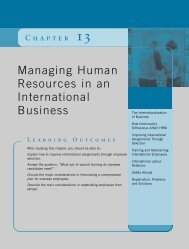launching a successful online business and ec projects - Prentice Hall
launching a successful online business and ec projects - Prentice Hall
launching a successful online business and ec projects - Prentice Hall
You also want an ePaper? Increase the reach of your titles
YUMPU automatically turns print PDFs into web optimized ePapers that Google loves.
Chapter Twelve: Launching a Successful Online Business <strong>and</strong> EC Proj<strong>ec</strong>ts W12.9<br />
will produce an overall more conservative estimate of benefits, building in an extra<br />
cushion for proj<strong>ec</strong>t success in the event that the <strong>business</strong> does not realize all quantified<br />
benefits.<br />
◗ Cost of the solution. This is an itemized <strong>and</strong> quantified list of costs associated with<br />
the <strong>online</strong> proj<strong>ec</strong>t. You should estimate both dir<strong>ec</strong>t costs (e.g., amortized costs of<br />
Web site development <strong>and</strong> Web site hosting) <strong>and</strong> indir<strong>ec</strong>t costs (e.g., staff training)<br />
for the period.<br />
◗ Net benefits. Add together all benefits (i.e., cost savings, new revenue, extra benefits)<br />
<strong>and</strong> subtract the costs. The result should be a sp<strong>ec</strong>ific amount of exp<strong>ec</strong>ted monetary<br />
gains (or losses) resulting from <strong>successful</strong> implementation of the proj<strong>ec</strong>t in<br />
each year of the period being examined.<br />
◗ R<strong>ec</strong>ommendation. Summarize the d<strong>ec</strong>ision that is being r<strong>ec</strong>ommended in light of<br />
the foregoing analysis. If the net benefit result is strongly positive, then a d<strong>ec</strong>ision to<br />
proceed is likely, <strong>and</strong> you can start the next steps (e.g., a risk analysis, customer survey,<br />
staff hiring). If the results are slightly positive or negative in one or all years of operation,<br />
you can still justify the d<strong>ec</strong>ision to proceed on the basis of seeing the <strong>online</strong> initiative<br />
as a long-term strategy, a competitive imperative, or simply the cost of staying<br />
in <strong>business</strong>. If the bottom line is strongly negative, then the most likely outcome will<br />
be a d<strong>ec</strong>ision that there is no justification for the proj<strong>ec</strong>t, saving the <strong>business</strong> a lot of<br />
time <strong>and</strong> money. Even that can be viewed as a positive outcome of a <strong>business</strong> case.<br />
For details of this high-level template, see Online Tutorial T1. For many sp<strong>ec</strong>ific<br />
templates, see score.org/template_gallery.html.<br />
FUNDING A NEW ONLINE BUSINESS<br />
Launching an <strong>online</strong> <strong>business</strong> can be expensive. The brave entrepreneur is usually willing<br />
to invest personal funds from savings, open personal lines of credit, or take a s<strong>ec</strong>ond<br />
mortgage out on his or her house, but these sources of “bootstrap funding” are unlikely<br />
to be sufficient. According to Maier (2005), entrepreneurs should “bootstrap” as long as<br />
possible, but not wait too long to tap into the venture community.<br />
If the new venture involves significant risk, traditional sources of debt financing,<br />
such as a bank loan, can be difficult or impossible to get. For other sources of funding for<br />
a start-up <strong>business</strong>, see Rutgers (2009). For an introduction to sources of e-<strong>business</strong><br />
funding, see <strong>business</strong>partners.com.<br />
First Round of Initial Funding: Angel Investors <strong>and</strong> Incubators<br />
When the entrepreneur’s personal funds are insufficient, the entrepreneur will go to<br />
friends, family members, or to angel investors. An angel investor is a wealthy<br />
individual who contributes personal funds <strong>and</strong> possibly expertise at the earliest stage of<br />
<strong>business</strong> development. Angel investors can be found through organizations such as the<br />
Angel Capital Association (angelcapitalassociation.org) <strong>and</strong> newspapers, magazines, <strong>and</strong><br />
<strong>business</strong>-oriented social networks (e.g., LinkedIn).<br />
An angel investor may provide the developer with an office, hardware, software,<br />
salary, <strong>and</strong> access to human <strong>and</strong> financial resources. In most cases, the angel investor<br />
also provides guidance or access to management expertise. In addition to sometimesaltruistic<br />
goals, the angel investor is looking for a reasonable return on the investment.<br />
In other words, the angel investor is almost always a preventure-capital funding source<br />
<strong>and</strong> may be paid later from the infusion of venture capital funds. An angel investor is an<br />
excellent source of funding for the entrepreneur; however, angel funding is scarce <strong>and</strong><br />
difficult to find.<br />
angel investor<br />
A wealthy individual<br />
who contributes<br />
personal funds <strong>and</strong><br />
possibly expertise at the<br />
earliest stage of<br />
<strong>business</strong> development.

















